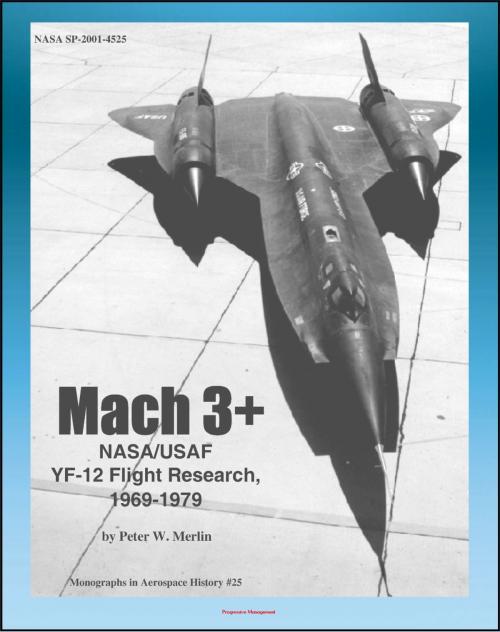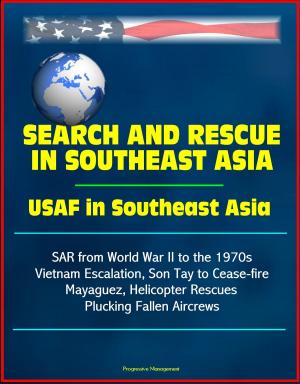Mach 3+: NASA/USAF YF-12 Flight Research, 1969-1979, Lockheed Blackbird Spyplanes as NASA/USAF Research Platforms (NASA SP-2001-4525)
Nonfiction, Science & Nature, Science, Physics, Astrophysics & Space Science, History, Americas| Author: | Progressive Management | ISBN: | 9781466075528 |
| Publisher: | Progressive Management | Publication: | February 7, 2012 |
| Imprint: | Smashwords Edition | Language: | English |
| Author: | Progressive Management |
| ISBN: | 9781466075528 |
| Publisher: | Progressive Management |
| Publication: | February 7, 2012 |
| Imprint: | Smashwords Edition |
| Language: | English |
This official NASA history document - converted for accurate flowing-text ebook format reproduction - provides a fascinating look at NASA's research program using the YF-12. Contents: Chapter 1: YF-12 Design and Development * Chapter 2: Joint USAF/ NASA YF-12 Research * Chapter 3: Heating and Loads Research * Chapter 4: Propulsion Research * Chapter 5: Landing Studies * Chapter 6: A Flying Laboratory * Chapter 7: Lessons Learned * Flight Logs - includes lists of the aircraft in the YF-12 program, crewmembers, and flight logs for each aircraft.
Among the aircraft designs that transitioned from paper to hardware during the high-speed era, the Lockheed Blackbirds hold a unique place. The A-12, YF-12A, M-21, D-21, and SR-71 variants outperformed all other jet airplanes in terms of altitude and speed. To this day, they remain the only production aircraft capable of sustained cruise in excess of Mach 3. Developed in utmost secrecy, they eventually became some of the world's most famous aircraft. Conceived originally as spyplanes, several Blackbirds saw service with the National Aeronautics and Space Administration (NASA) as research platforms. This monograph describes the first major NASA project involving the Blackbirds. Conducted with the U.S. Air Force (USAF) as a partner, the NASA/USAF YF-12 research lasted 10 years, and produced a wealth of data on materials, structures, loads, heating, aerodynamics, and performance for high-speed aircraft.
More than two decades after the program ended, no comprehensive history of the joint program has yet been written. This monograph is an attempt to rectify that deficiency. Until recently, security restrictions prevented the release of some information relative to the YF-12. Since then, numerous documents have been declassified, and program participants are free to speak about previously restricted aspects of the project. Unfortunately, some who contributed to the NASA/USAF YF-12 investigations have not outlived the blanket of security that covered their work. Those who have must reach back more than 20 years to retrieve anecdotes and historical details. In a sense, the oral history interviews in this monograph amount to a sort of salvage archeology into the fading memories of the remaining YF-12 participants. Over the years, numerous books and articles have been written about the Blackbirds, but few give more than a brief description of the YF-12 and its role as a research aircraft. In this monograph, I briefly describe the origins of the Blackbird family of aircraft and how NASA became involved with them. Each of the following chapters then describes a facet of the NASA/USAF YF-12 research program in detail. This monograph would not have been possible without access to numerous technical reports (some recently declassified), briefings, and other source material from the NASA Dryden Historical Reference Collection, as well as the oral interviews that fleshed out the story and provided an insider's view of the project.
This official NASA history document - converted for accurate flowing-text ebook format reproduction - provides a fascinating look at NASA's research program using the YF-12. Contents: Chapter 1: YF-12 Design and Development * Chapter 2: Joint USAF/ NASA YF-12 Research * Chapter 3: Heating and Loads Research * Chapter 4: Propulsion Research * Chapter 5: Landing Studies * Chapter 6: A Flying Laboratory * Chapter 7: Lessons Learned * Flight Logs - includes lists of the aircraft in the YF-12 program, crewmembers, and flight logs for each aircraft.
Among the aircraft designs that transitioned from paper to hardware during the high-speed era, the Lockheed Blackbirds hold a unique place. The A-12, YF-12A, M-21, D-21, and SR-71 variants outperformed all other jet airplanes in terms of altitude and speed. To this day, they remain the only production aircraft capable of sustained cruise in excess of Mach 3. Developed in utmost secrecy, they eventually became some of the world's most famous aircraft. Conceived originally as spyplanes, several Blackbirds saw service with the National Aeronautics and Space Administration (NASA) as research platforms. This monograph describes the first major NASA project involving the Blackbirds. Conducted with the U.S. Air Force (USAF) as a partner, the NASA/USAF YF-12 research lasted 10 years, and produced a wealth of data on materials, structures, loads, heating, aerodynamics, and performance for high-speed aircraft.
More than two decades after the program ended, no comprehensive history of the joint program has yet been written. This monograph is an attempt to rectify that deficiency. Until recently, security restrictions prevented the release of some information relative to the YF-12. Since then, numerous documents have been declassified, and program participants are free to speak about previously restricted aspects of the project. Unfortunately, some who contributed to the NASA/USAF YF-12 investigations have not outlived the blanket of security that covered their work. Those who have must reach back more than 20 years to retrieve anecdotes and historical details. In a sense, the oral history interviews in this monograph amount to a sort of salvage archeology into the fading memories of the remaining YF-12 participants. Over the years, numerous books and articles have been written about the Blackbirds, but few give more than a brief description of the YF-12 and its role as a research aircraft. In this monograph, I briefly describe the origins of the Blackbird family of aircraft and how NASA became involved with them. Each of the following chapters then describes a facet of the NASA/USAF YF-12 research program in detail. This monograph would not have been possible without access to numerous technical reports (some recently declassified), briefings, and other source material from the NASA Dryden Historical Reference Collection, as well as the oral interviews that fleshed out the story and provided an insider's view of the project.















